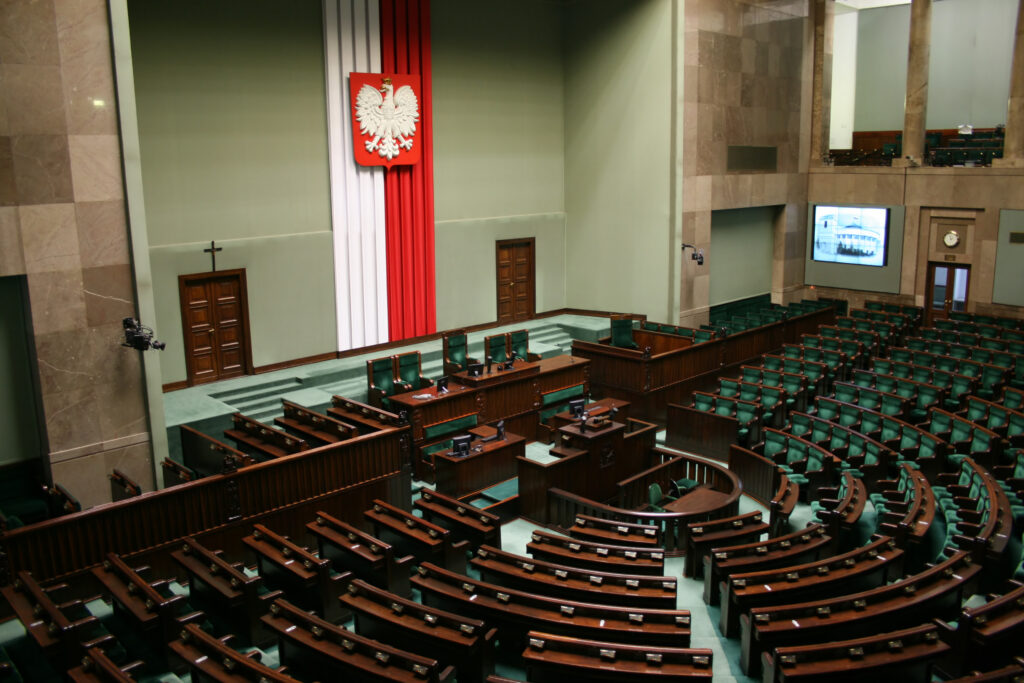- According to press reports, Minister of Justice Waldemar Żurek plans to dismiss the current members of the National Council of the Judiciary by way of a Sejm resolution and reinstate those who sat on the Council at the beginning of 2018.
- Such a solution would obviously be unconstitutional – the Sejm has no legal basis for adopting such resolutions, and the Constitution does not allow for the dismissal of KRS members before the end of their term of office.
Last Thursday (14 August), on the eve of the Feast of the Assumption of the Blessed Virgin Mary, the press published information about the ideas of the new Minister of Justice, Waldemar Żurek, on how to take control of the National Council of the Judiciary.
This information was to be confirmed by an anonymous judge who sat on the KRS until 2018. According to the authors of the press reports, the Ministry of Justice did not deny their veracity. But what exactly is the new Minister’s idea?
It assumes that the Sejm of the Republic of Poland would adopt a resolution declaring the election of the current judges of the National Council of the Judiciary, which took place in 2018, invalid. In the same resolution, the Sejm would declare the resumption of the term of office of the judges who were members of the KRS until March 2018.
However, this proposal must be considered fundamentally unconstitutional. Firstly, a Sejm resolution is not a source of law and therefore can only have legal effects if it has a legal basis in a generally binding act (the Constitution or an ordinary act). However, there is no legal provision that would authorise the Sejm to adopt resolutions of this kind.
Secondly, interrupting the term of office of judges who are members of the National Council of the Judiciary before its expiry (which will not occur until 2026) would constitute a violation of Article 187(3) of the Constitution, according to which:
The term of office of the elected members of the National Council of the Judiciary shall be four years.
It is a fact that Article 6 of the Act of 8 December 2017 amending the Act on the National Council of the Judiciary and certain other acts provides for the shortening of the term of office of the then members of the KRS:
The term of office of members of the National Council […] elected under the existing provisions shall continue until the day preceding the commencement of the term of office of the new members of the National Council of the Judiciary, but not longer than 90 days from the date of entry into force of this Act, unless it has expired earlier in connection with the expiry of the term of office.
However, this solution was intended to implement the judgment of the Constitutional Tribunal of 20 June 2017 (K 5/17), which declared unconstitutional the then provisions on the election ofmembers of the National Council of the Judiciary, primarily due to the quotas in force at that time for courts of different levels – fifteen members of the National Council of the Judiciary were elected, pursuant to Article 187(1)(2) of the Constitution, from among judges of the Supreme Court, courts of general jurisdiction, administrative courts and military courts:
- the General Assembly of Judges of the Supreme Court elected two members of the Council from among the judges of that court,
- the General Assembly of Judges of the Supreme Administrative Court, together with representatives of the general assemblies of provincial administrative courts, elected two members of the Council from among the judges of administrative courts,
- a meeting of representatives of the assemblies of judges of the courts of appeal elected two members of the Council from among its members,
- a meeting of representatives of the general assemblies of district judges elected eight members of the Council from among its members,
- the Assembly of Military Court Judges elected one member of the Council from among its members.
The Constitutional Tribunal found this solution to be discriminatory against lower-level judges and thus restricting their passive right to vote. In view of the above, the legislator considered it reasonable, if not necessary, in order to restore the situation in accordance with the Constitution, to shorten the term of office of judges who were members of the National Council of the Judiciary and who were elected in a procedure that the Constitutional Tribunal found to be unconstitutional. In the justification for the draft, reference was made to the Constitutional Tribunal’s judgment of 18 July 2007 (K 25/07), in which the Tribunal ruled that
only the indication of extraordinary, constitutionally justified circumstances of the adopted regulation […] [could] possibly justify a breach of the principle of term limits.
In the case of the shortening of the term of office in 2018, this extraordinary, constitutionally justified circumstance was precisely the Constitutional Tribunal’s finding that the provisions governing the election of judges to the National Council of the Judiciary were contrary to the Constitution. However, a similar circumstance does not exist at present. On the contrary, in its judgment of 25 March 2019 (K 12/18), the Constitutional Tribunal explicitly recognised the current provisions of the Act on the National Council of the Judiciary governing the election of judges who are members of the National Council of the Judiciary as consistent with the Constitution. Thus, an attempt to remove the judges who are members of the current National Council of the Judiciary from office, not only by means of a resolution, which, as indicated above, is not an act of generally binding law, but also by means of an ordinary act, would have to be considered inadmissible.
Therefore, if the Sejm decided to take such a step, as indicated by representatives of the association ‘Lawyers for Poland’, this could be considered a criminal offence under Article 231 § 1. of the Criminal Code :
A public official who, exceeding his powers or failing to fulfil his duties, acts to the detriment of public or private interests, shall be subject to imprisonment for up to 3 years.
The idea of the Ministry was described even more harshly by Marcin Przydacz, Minister in the Chancellery of President Karol Nawrocki, pointing out that it may constitute a crime under Article 128 § 1 of the Criminal Code:
Whoever, with the aim of removing a constitutional body of the Republic of Poland by force, undertakes activities directly aimed at achieving this goal, shall be subject to imprisonment for a term of between 3 and 20 years.
Importantly, this is one of the few offences specified in the Code for which not only the actual commission or attempt is punishable, but also the mere preparation, as provided for in Article 128 § 2 of the Criminal Code:
Whoever prepares to commit an offence specified in § 1 shall be subject to imprisonment for a term of between 3 months and 5 years.
At this point, it is difficult to say whether the Ministry will decide to implement the above-described, clearly unconstitutional idea. This is all the more so because, in addition to legal doubts, there are quite practical doubts associated with its implementation. Namely, when the judges-members of the National Council of the Judiciary were appointed in 2018 under the new rules, only 13 of the 15 seats were filled on the basis of provisions that the Constitutional Tribunal had found unconstitutional. Of these 13, three judges have since retired, one has died, and another – Waldemar Żurek himself, in connection with his appointment as minister – has resigned from his position as judge. All these circumstances, in accordance with Article 14 of the Act on the National Council of the Judiciary, result in the expiry of the mandate of the member concerned before the end of their term of office. Therefore, even if the term of office were to be reinstated, apart from its obvious unconstitutionality, it could only apply to eight people – the remaining seven would have to be selected in some other way.
Perhaps this is why, at the moment, everything seems to indicate that the current ruling majority will rather go with the earlier proposal, put forward by Minister Bodnar, i.e. to elect new judges to the National Council of the Judiciary based on the current regulations.
However, as we have already pointed out, such a solution would demonstrate the extreme hypocrisy of the current government, which on the one hand (albeit groundlessly) calls these provisions unconstitutional, and on the other is prepared to apply them. The announcements made on this occasion that this contradiction would be resolved by preceding the formal presentation of candidates for the National Council of the Judiciary by the Sejm with informal elections conducted by the judges themselves not only fail to resolve the above doubts, but actually increase them. This raises obvious questions about the fairness and transparency of such an informal procedure, especially since the Ministry will probably seek to exclude judges appointed or promoted since 2018.
On the other hand, returning to Minister Żurek’s idea revealed by the press, in light of his statements made shortly after taking office, according to which he does not intend to be overly concerned with the letter of the law:
the feeling that acting on the principle of ‘let’s stick strictly to the law passed by an authoritarian government, because it is the law after all’ is a road to nowhere.
– However, one cannot be sure that he will not decide to at least attempt to remove the current KRS on the basis of an unlawful resolution of the Sejm. In such a situation, in view of the justified resistance of the current judges who are members of the KRS, forceful solutions will certainly have to be found. In this regard, it should also be recalled that the current government, while Minister Bodnar was still in office, set a dismal precedent by storming the headquarters of the KRS in order to seize disciplinary files originally held by the Disciplinary Ombudsman for Judges of the Court of General Jurisdiction and his deputy.
Will we witness such scenes again in the near future? Time will tell, but the very fact that we are forced to consider this speaks volumes about the current government’s respect for the rule of law.
Image source: Adobe Stock.



